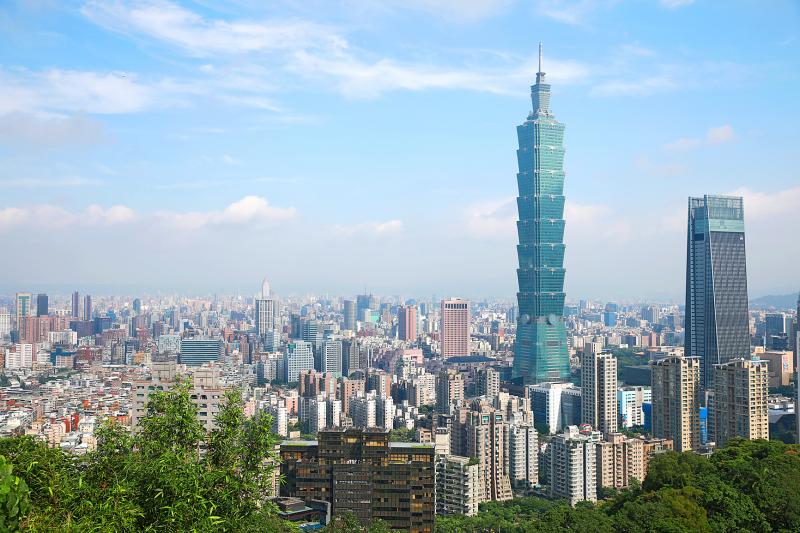About US$5.5 billion worth of commercial property changed hands in Taiwan last year, soaring 49 percent from a year earlier to a record high, fueled by strong performance in the industrial sector and a substantial hotel deal, Real Capital Analytics Inc said in a report yesterday.
“Taiwan made record in a positive way, thanks to the benefits of coming down hard on the COVID-19 pandemic and border controls early last year paid dividends for commercial property investors,” said David Green-Morgan, Real Capital managing director for the Asia-Pacific region.
It was the second time that Taiwan outperformed Singapore in commercial property deals, Green-Morgan said.

Photo: I-Hwa Cheng, Bloomberg
Industrial investments received a boost from continued realignment of electronics supply chains in the region, prompted by US-China trade tensions and accelerated by the COVID-19 pandemic, Real Capital said.
Sales of commercial property in the Asia-Pacific region picked up in the fourth quarter of last year, ending the pandemic-blighted year on a brighter note, it said.
Fourth-quarter sales reached US$44.7 billion, 10 percent lower than the same period in 2019 before the pandemic cast a shadow over the region, it added.
Last year’s sales in the region totaled US$141.2 billion across major income-producing property types, slumping 23 percent from a peak a year earlier, Real Capital said.
Several sectors and geographies surpassed previous levels in terms of dealmaking, despite the challenges presented by lockdowns, travel bans and the dimmed economic outlook, it said.
Taiwan, South Korea and India all hit record acquisition levels as a surge in demand for logistics facilities and data centers bolstered the industrial sector, it said.
Sales of development sites, principally in China, recovered 9 percent in the final quarter from a year earlier, but fell 7 percent for the whole of last year, with annual deal volume of US$628.5 billion, it added.
“The market has steadied and saw a rebound in the fourth quarter after a bleak and uncertain start to 2020,” Green-Morgan said.
The trend bodes well for market activity as Real Capital said it saw a number of deals across the region roll over into this year.
The industrial sector would forge ahead, thanks mainly to record trading of logistics assets and a spike in demand for data centers, it said.
Transactions in the logistics sector exceeded US$13 billion for the third consecutive year, as demand continues to outstrip supply, Real Capital said.
Data center deals more than tripled over the 2019 levels to almost US$5 billion in investment, it said.

Shares in Taiwan closed at a new high yesterday, the first trading day of the new year, as contract chipmaker Taiwan Semiconductor Manufacturing Co (TSMC, 台積電) continued to break records amid an artificial intelligence (AI) boom, dealers said. The TAIEX closed up 386.21 points, or 1.33 percent, at 29,349.81, with turnover totaling NT$648.844 billion (US$20.65 billion). “Judging from a stronger Taiwan dollar against the US dollar, I think foreign institutional investors returned from the holidays and brought funds into the local market,” Concord Securities Co (康和證券) analyst Kerry Huang (黃志祺) said. “Foreign investors just rebuilt their positions with TSMC as their top target,

REVENUE PERFORMANCE: Cloud and network products, and electronic components saw strong increases, while smart consumer electronics and computing products fell Hon Hai Precision Industry Co (鴻海精密) yesterday posted 26.51 percent quarterly growth in revenue for last quarter to NT$2.6 trillion (US$82.44 billion), the strongest on record for the period and above expectations, but the company forecast a slight revenue dip this quarter due to seasonal factors. On an annual basis, revenue last quarter grew 22.07 percent, the company said. Analysts on average estimated about NT$2.4 trillion increase. Hon Hai, which assembles servers for Nvidia Corp and iPhones for Apple Inc, is expanding its capacity in the US, adding artificial intelligence (AI) server production in Wisconsin and Texas, where it operates established campuses. This

Nvidia Corp chief executive officer Jensen Huang (黃仁勳) on Monday introduced the company’s latest supercomputer platform, featuring six new chips made by Taiwan Semiconductor Manufacturing Co (TSMC, 台積電), saying that it is now “in full production.” “If Vera Rubin is going to be in time for this year, it must be in production by now, and so, today I can tell you that Vera Rubin is in full production,” Huang said during his keynote speech at CES in Las Vegas. The rollout of six concurrent chips for Vera Rubin — the company’s next-generation artificial intelligence (AI) computing platform — marks a strategic

US President Donald Trump on Friday blocked US photonics firm HieFo Corp’s US$3 million acquisition of assets in New Jersey-based aerospace and defense specialist Emcore Corp, citing national security and China-related concerns. In an order released by the White House, Trump said HieFo was “controlled by a citizen of the People’s Republic of China” and that its 2024 acquisition of Emcore’s businesses led the US president to believe that it might “take action that threatens to impair the national security of the United States.” The order did not name the person or detail Trump’s concerns. “The Transaction is hereby prohibited,”